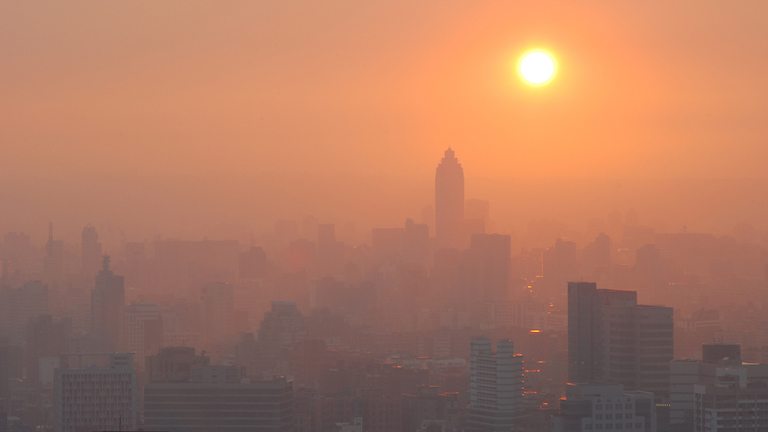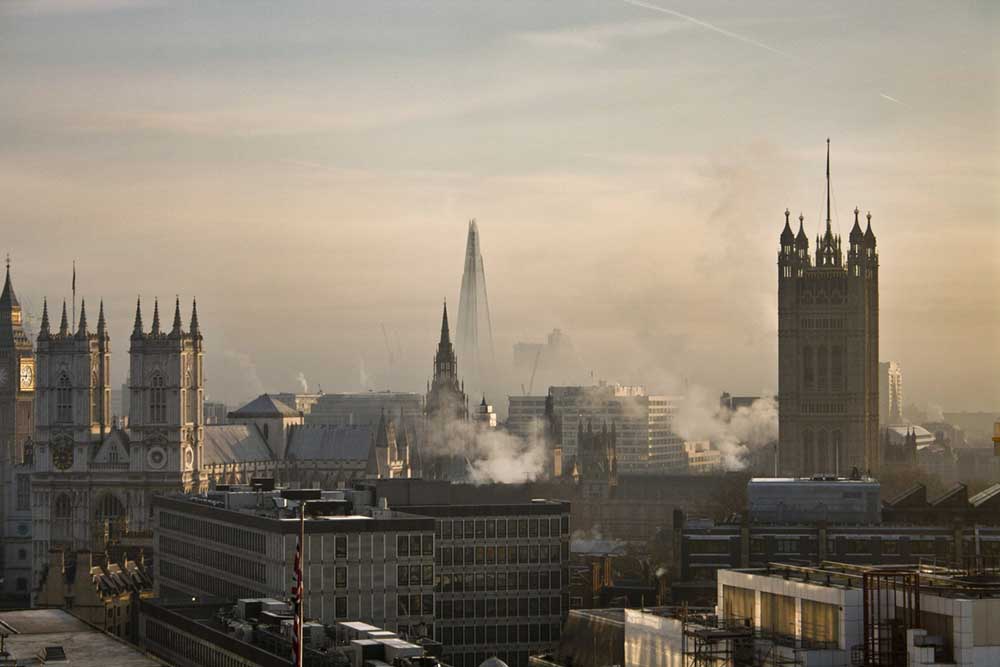Pollution is killing us – officially – research has found it’s the number one cause of death in the world. But there’s plenty to you can do to minimise its effects. Mary Stratton reports
Pollution is in the firing line again and this time it’s threatening children.
Recent news has revealed that children who live in areas with higher air pollution when they are younger are significantly more likely to developed major depression by the age of 18.
In a first analysis of how air pollution affects teenage mental health, researchers have found that young people were three to four times more likely to have depression at age 18 if they had been exposed to dirtier air at age 12.
Comparison with earlier investigations, indicates that air pollution is a greater risk factor than physical abuse in raising the risk of teenage depression.
The findings are particularly significant as 75% of mental health problems begin in childhood or adolescence, when the brain is developing rapidly.
The study, published in the journal Psychiatry Research, combined information from a group of children in London with high-resolution data on air pollution levels.
Of the 284 children studied, those who lived in the top 25% most polluted areas at age 12 were found to be three to four times more likely to have depression at 18, compared with those living in the 25% least polluted areas.
Most of us take care to avoid sugar, salt and take-away food and to limit our couch potato days as much as we can. But an alarming number of reports recently have pointed to an invisible enemy that none of us can control – Britain’s soaring pollution levels.
One report put pollution as the number one cause of death in the world and research linked high pollution levels to brittle bones and higher risk of osteoporosis. Meanwhile, the Royal College of Physicians has released a report stating that pollution in the air in Britain is ‘too dangerous to breathe’ in 44 out of the 51 towns and cities included in the report. It’s frankly terrifying.
The UK has one of the highest pollution death rates in Europe, and toxic air is a huge health hazard. ‘It’s not like the smogs of the 1950’s, where you could see it, taste it and almost feel it,’ says Professor Stephen Holgate, Medical Research Council Clinical Professor of Immunopharmacology and Honorary Consultant Physician within Medicine at the University of Southampton. ‘This pollution is invisible, so it is harder to understand the extent of health damages.’
Professor Holgate revealed that chronic exposure to pollution contributes to most degenerative diseases, such as dementia, lung disease and heart disease.
Such toxic air has a huge affect on health, the environment, and even food produce. Professor Holgate revealed that chronic exposure to pollution contributes to most degenerative diseases, such as dementia, lung disease and heart disease. ‘Around 200,000 people have their symptoms increase due to chronic exposure to pollution,’ he asserts.
Walking down a heavily polluted street, like Oxford Street, can actually prevent the cardio benefits of walking, a study has found. This study was conducted in over 60’s with varying health levels, it is concerning because light cardio exercise, such as walking, is recommended by the NHS to aid cardiovascular and lung problems.
Prof. Holgate highlights that ‘It is even more damaging during pregnancy, and pollution can affect the way the lungs of the foetus develop, increase prematurity, stillbirths, and the risks of young babies developing infections when they’re born’. A recent report by Imperial College London revealed that pollution is effecting the way the foetus develops, causing them to be small for gestational age and a low birth weight.
Pollution can be four to five times higher inside your car than out of it.
Last month London mayor Sadiq Khan introduced a T-charge on gas-guzzling cars in London to combat air pollution. Diesel cars are blamed heavily for the rise in toxic NO2 levels in Britain’s air.
But what about the rest of us? While you can’t change the state of the air you breathe every day, you can change your reaction to it with some easy but effective life hacks. We have put together a list of the best ways to keep yourself protected, and no, wearing a mask isn’t one of them.
1. Use apps to avoid high pollution routes
Levels of pollution change just as quickly as the weather, so there are times that you can go out when the pollution won’t be as harmful – a number of apps can help you gauge this.
Plume Air Report tells you the pollution rates in real time, and when it is best to do certain activities. One of the best features of this app is the you can actually see how the pollution is going to evolve next.
CityAir tells you when the pollution level is high and is able to give you tailored advice to reduce both your emissions and your exposure to pollution.
CleanSpace Air Pollution app shows you pollution in the air, both inside and outside. It also shows you the impact of your clean travel choices. The unique thing about this app is that it allows you to see the levels of pollution inside, which is not always easy to find out.
2. Drive less, walk more
This one is easier said than done, but if you can switch from driving into work to going by bus it can make a difference. Or walk your kids to school instead of giving them a lift. Believe it or not, pollution can be four to five times higher inside you car than outside, so being in your car isn’t actually stoping the harmful pollutants reaching you.
Prof. Holgate explains that when you’re using the heater in your car, it ‘draws in the exhaust fumes from the vehicle in front’, which can be particular bad in traffic jams. Using the apps we suggested you can avoid the most polluted routes and stop some of your emissions.
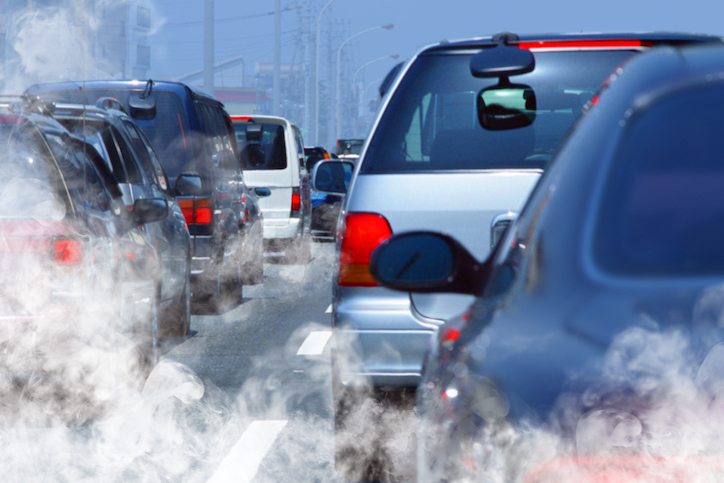
3. Try going veggie for more of your meals
It’s easy to forget just how many chemicals go into the food we eat, from restaurants to processed groceries, we consume a lot of unnatural pollutants. Going veggie for just a few meals a week can make such a big difference.
Meat can often contain different products to preserve it, and make it more appealing to consumers, which are harmful to your body. Also, the meat will have whatever pollutants that the animal was exposed to, particularly pesticides from their food.
Watch Healthista’s Meat-Free Monday recipe series
4. Opt for organic food
While there has been debate about how good organic food actually is for you, by law to call something organic it has to follow specific limits regards pesticides and treatments. That means organic food will have fewer pollutants than other food.
Pesticide Action Network UK, a UK charity focused on tackling the problems caused by pesticides, have a guide that tells you what fruit and vegetables are most likely to contain pesticides or chemicals. Using this you can figure out what fruit and veg you should try to buy organically.
5. Up your anti-oxidant intake
Pollution means our exposure to toxins and free radicals are high and these can be ageing to skin, thanks to the oxidative stress this causes to the body. You can help this process by introducing more antioxidants into your diet.
Antioxidants react with free radicals and toxins to help stop the chain of damage in the body. Organic crops are 60 per cent higher in antioxidants, so going organic will help. But you can also look to eat more purple, red, yellow and orange fruit and veg, which tend to be high in antioxidants. Drinking green tea is also a good idea.
Try: Healthista Glow Food (£18.95 from Healthista Shop), a potent powder containing high antioxidant levels from red berries, lucuma and macqui berries.
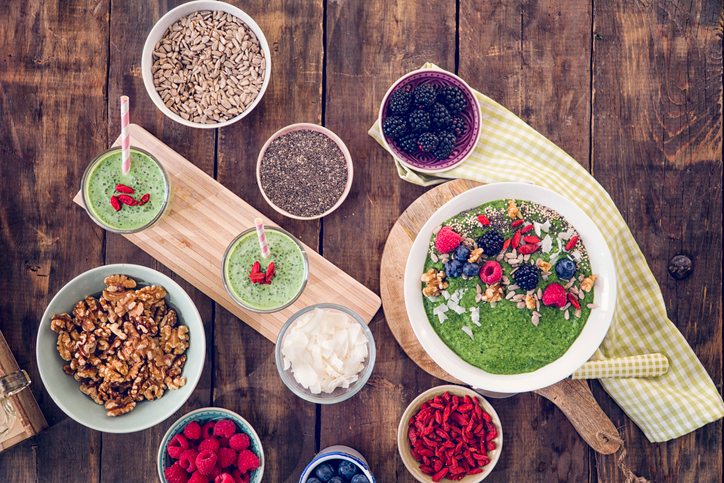
6. Check what’s really lurking in your building
Indoor pollution can be just as damaging as outdoor pollution, because the levels are often more concentrated. There are different causes of pollution inside your home including humidity and poor ventilation, and even radon. Radon is a colourless, odourless, tasteless gas, which happens to be radioactive.
The danger comes from that fact that you, yourself, have no way of detecting radon in your home. It’s present in every building, but the majority of the time, levels are low and not harmful. You can investigate whether your property has harmful levels of radon – an interactive map here shows where high levels of radon are most likely. If you’re still concerned, you can pay to have radon testing done in your home.
7. Open your windows
When it comes to humidity and ventilation, the best thing you can do is open windows and allow air to circulate through your house. Even having your windows open for 15 minutes a day can make a huge difference to the level of pollution in your home. It’s best to do this if you have been using strong cleaning products, painting, or after cooking. Even your furniture can be impacting the air in your home, with some furniture containing formaldehyde and other harsh chemicals that are harmful to inhale.
Towards the winter this may not always be possible – this is where an air purifier or dehumidifier could help and which one you choose will depend on what is causing the pollution in your home. An air purifier will filter out smoke, pollen and other irritants that may be lurking in your home while a dehumidifier will extract the moisture from the air, killing mould and stopping the threat of bacteria that thrive in moisture.
You can also invest in some house plants, which will not only brighten up your home but also naturally filter out nasty pollutants in the air. During photosynthesis, plants draw in carbon dioxide and release oxygen into your home.
8. Use natural cleaning products
Most cleaning products contain harsh chemicals, which release toxic pollutants into your home. Prof. Holgate explains that pollution indoors can come from cooking and cleaning products, which release chemicals. He emphasises that indoor pollution ‘is something we need more information on’ but the health effects of indoor pollution are going to be quite substantial.
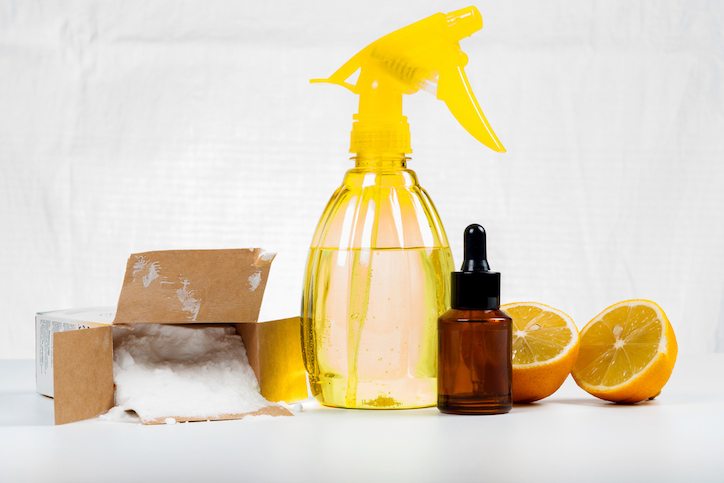
To avoid toxins, you can create you own cleaning products using vinegar, lemon, baking soda etc. You can also start buying all natural and organic cleaning products. For example, using a natural loofah instead of your usual sponge. CHEM Trust, a UK charity that works to prevent pollution causing excessive damage to humans and wildlife, have a guide of toxins you should avoid, such as triclosan and parabens.
This guide also shows what independent ecolabels, like EU ecolabel, the Blue Angel or the Nordic Ecolabel, you should look out for. These labels show you whether a product is environmentally friendly and safe.
Try: the ECover range of cleaning products available to buy here
9. Find an antipollution beauty regime
As well as damaging your health, pollution can also be ageing and harsh to skin. We can’t stress enough the importance of taking your make up off and cleansing your face at the end of the day, especially if you live/work in a city. The dirt and pollution clings to your skin so the first step to protecting yourself is to clean all of it away. From detox face masks, to antioxidant filled serums, it’s now surprisingly easy to find antipollution skincare.
Try: Exuviance Antioxidant Perfect 10 Serum The six potent antioxidants in this serum, such as grape seed and green tea extract, together with vitamins C and E, supposedly work to defend the skin from ten sources of oxidative damage, including pollution. Apply between cleansing and moisturising.
Elizabeth Arden Prevage City Smart SPF 50 Hydrating Shiel Combining pollution and UV protection is the Prevage City Smart lotion, containing SPF 50 sunscreen and Anti-Pollution Technology. Apparently, this technology creates an invisible barrier to prevent the penetration of harmful toxins, with optical diffusers to leave the skin with a radiant appearance.
Sukin OB Charcoal Facial Masque £11.95 which contains powerful charcoal that helps draw out impurities from skin – used once or twice a week it can help combat pollution’s effect on skin.
Check out the rest of our suggestions for your antipollution skincare routine here.
10. Write to your local MP
If you are concerned about pollution and the damage it is doing to you and your family, writing to your local government about the issue can help. We are living in a country where this issue is going to be tackled by the government eventually, but the more public backing, the more work they will do. Prof. Holgate suggests requesting ‘that more information is provided about local air quality around where people live, travel, work, shop and go to school’. We need more monitoring of air pollution on a local level and this information needs to be accessible to the public. Prof. Holgate goes on to say that we should ask for MPs ‘to ensure that the messages get through to the government that local authorities need help from central government to clean up the air’. CHEM Trust also has a guide for writing to your local MP or MEP about the issue.
More Healthista Content:
10 steps to stop pollution ageing your skin
Gentle Cleanse & Make Up Remover
Like this article? Sign up to our newsletter to get more articles like this delivered straight to your inbox.



